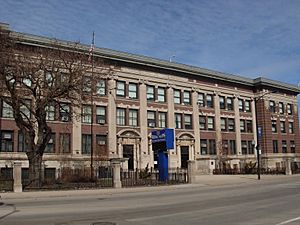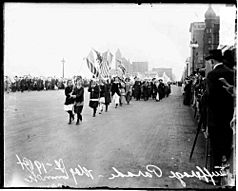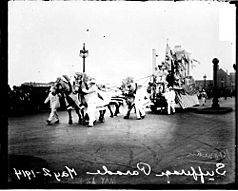Viola Hill facts for kids
Viola Hill (born 1892) was an amazing African-American woman. She fought for women's right to vote (a suffragist), was an activist, and a talented musician. She helped start the Alpha Suffrage Club and was a leader in her church, the African Methodist Episcopal Church.
Contents
Early Life and Activism
Viola Hill was born in September 1892 in Athens, Georgia. Her mother, Mattie Hill, was a laundress, and her father, Carey J. Hill, was a day laborer. Around 1900, her family moved to Chicago. Many Black families moved north during this time. They were looking for better opportunities and to escape unfair treatment in the South.
In 1910, Viola graduated from Wendell Phillips High School. This school was in the Bronzeville neighborhood of Chicago. It was the city's first high school mainly for Black students.
Soon after graduating, Viola started her activism. In 1911, she played piano at an event for the Negro Fellowship League. This group was started by Ida B. Wells in 1910. It helped Black people in Chicago, especially those who had just moved from the South during the Great Migration. Other groups like the YMCA did not accept Black members then.
Viola also hosted social clubs at her home in Chicago. This shows she was a community leader from a young age.
Fighting for Women's Vote
In 1913, Viola Hill gave a speech at the Alpha Suffrage Club. This was the first club for Black women fighting for the right to vote in Illinois. Viola became the club's second vice president. Other important members included Ida B. Wells and Mary E. Jackson.
The Alpha Suffrage Club (ASC) was very important. In 1913, they sent Ida B. Wells to a big national parade called the 1913 Woman Suffrage Procession. The club also published a newspaper called the Alpha Suffrage Record. This paper helped teach the community about local issues and who to vote for.
By 1914, women in Illinois could vote in local elections. Black suffragists like Viola Hill immediately got to work. They went door-to-door to encourage people to vote. They also marched in suffrage parades. Black women were a big part of the May 1914 parade in Chicago. Viola Hill even wrote about this parade for The Chicago Defender, an important African-American newspaper. She wrote several articles for this paper.
As a leader in the ASC, Viola organized many community events. Important speakers, like activist Jane Addams, came to talk to the club. Political candidates also visited to ask for votes.
Viola Hill and the ASC also helped elect Chicago's first Black alderman, Oscar Stanton De Priest. An alderman is a local politician who represents a part of the city. In 1914, De Priest was the first Black person to run for this role in his area. He said the ASC was a big reason he won.
Leadership in the AME Church
Viola Hill held many leadership roles in the AME Church. This was a time when women were fighting for more rights in society and in the church.
In 1914, Viola was a secretary for the Allen Christian Endeavor League in Chicago. She helped organize a fundraiser for the League. In 1918, she became its treasurer. This AME group helped young people live a Christian life and do charity work.
From 1914 to 1916, Viola worked at St. Mary's AME Church. She was the assistant superintendent of its Sunday school. She often taught classes and organized church events like banquets.
In 1916, Viola wrote an article for The Chicago Defender about a Sunday school convention. Teachers and pastors from AME churches in Chicago met to talk about education.
In the 1930s, Viola Hill directed the choir for the Carey Temple AME Church in Chicago.
Later Life and Music
Viola Hill continued to lead community choirs through the 1920s, 1930s, and 1940s. She was also the vocal director for a swing version of The Mikado. This was a funny opera. The 1939 show was part of the Federal Theatre Project. This program was created during the Great Depression to help artists. The cast of this Mikado was all Black.
Later, Viola Hill joined the advisory board for the National Association of Negro Musicians (NANM). This group was started in Chicago in 1919. It helps promote Black music and brings Black musicians together.
Viola Hill lived in Chicago for most of her life. Census records show her living there from 1910 to 1940. She never married and did not have children. She passed away sometime after 1940.





